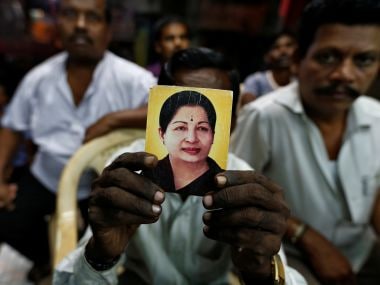One of the first dents in Jayalalithaa’s (her name is sometimes spelled Jayalalitha) popularity was when she held a conspicuously ostentatious wedding for her foster son VN Sudhakaran who was the nephew of her close confidante Sasikala Natarajan. This was in 1996 and people believed this was the most expensive wedding ever seen in Tamil Nadu with its two-kilometre long illuminated barat route, ten dining halls which could accommodate over 2.5 lakh guests and elaborate wedding pandal that covered over 75,000 square feet. Each wedding card was accompanied with a silver plate, silk sari and a silk dhoti and is said to have cost over Rs 20,000 Sudhakaran was said to be groomed to become Jayalalithaa’s heir and was getting married to Shivaji Ganesan’s granddaughter Sathyalakshmi. [caption id=“attachment_3141628” align=“alignleft” width=“380”]  A supporter Jayalalithaa holds her photo. Reuters[/caption] By today’s standards, the wedding can hardly be described as ostentatious, overtaken as it is by other even more ostentatious weddings. If this wedding had cost her Rs 100 crore, twenty years later, mining magnet Janardhan Reddy’s daughter’s wedding held at the Bengaluru Palace Grounds is reported to have cost over Rs 550 crore. For the wedding of Transport Minister Nitin Gadkari’s daughter, about 30 chartered flights touched down in Nagpur. An angry former chief minister M Karunanidhi had in 1996 asked how arch rival Jayalalithaa had spent so much money when she drew just rupee one as salary every month. Women groups and lawyers went to town over her extravaganza and managed to whip up a wave of anti-Jayalalithaa sentiment accusing her of misusing public machinery for a private function. This was followed by police raids on her residence where they netted over 11,000 saris, 750 pairs of shoes and a three-pound diamond studded gold belt. She found herself being accused of being another Imelda Marcos, the wife of deposed Philippines President Ferdinand Marcos, who was found (following raids) to have 3,000 pairs of shoes in her closet. The adverse publicity saw the party losing elections in May 1996 and she herself was defeated from the Bargur constituency. This was a low period for Jayalalithaa because it saw 48 cases being slapped against her and her aide Sasikala. On 27 August 1996, she snapped ties with Sasikala and disowned her foster son Sudhakaran. December of the same year saw her being arrested and having to spend a month in prison. This one month period must have been a learning curve for her because after her release, it saw Jayalalithaa emerge as someone who shunned ostentation. She dressed simply and wore no jewellery. She also publicly promised to change and devote herself to the welfare of her citizens. She kept her promise and introduced several welfare schemes across the state. Following her re-election, she started a number of populist schemes aimed at creating a strong base for her party. In this, she succeeded. Her Amma canteens, Amma pharmacies, the mixers and grinders, and colour TV sets given to the voters won her the hearts of the Tamilian people. Even prior to her release from jail, she had a marked pro-people tilt. In 1991, she swept the elections with the AIADMK party winning 225 seats out of 234. The women in Tamil Nadu had rallied around in large numbers. And it was in one such election rally which I attended that she announced that all girl students passing the tenth standard would be given a bicycle. The cradle baby scheme for girl infants who are deserted by their families along with TASMAC was also introduced. These and several other welfare measures have ensured that Tamil Nadu has some of the best social indicators amongst all the states in the country. For a leader who was a reluctant politician and started out as an ostentatious displayer of power and pelf, it is no small matter that one of the principal reasons why she will be remembered for is making welfarism an accepted, even emulated, part of statecraft.
For a leader who was a reluctant politician and started out as an ostentatious displayer of power and pelf, it is no small matter that one of the principal reasons why Jayalalithaa will be remembered for is making welfarism an accepted, even emulated, part of statecraft.
Advertisement
End of Article


)

)
)
)
)
)
)
)
)



